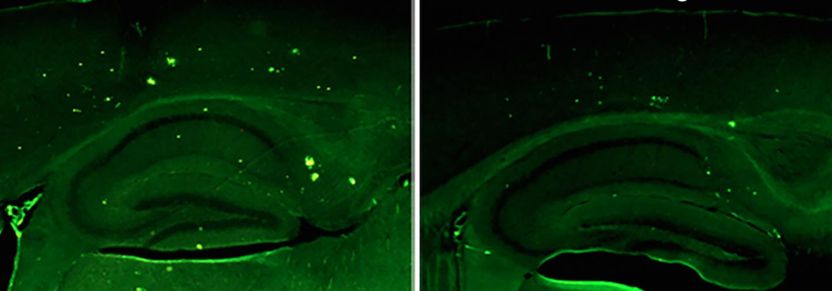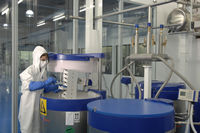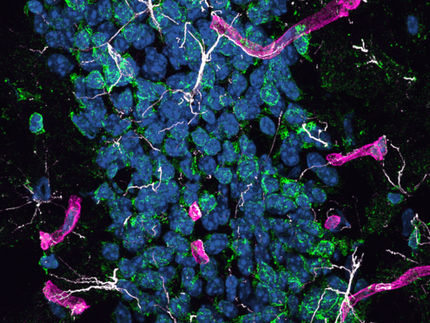Elevating brain protein allays symptoms of Alzheimer's and improves memory
Boosting levels of a specific protein in the brain alleviates hallmark features of Alzheimer's disease in a mouse model of the disorder, according to new research.

In a mouse model of Alzheimer's disease, Salk Institute researchers show that raising levels of neuregulin-1 (right) lowers a marker of disease pathology in a part of the brain that controls memory compared with controls (left).
Salk Institute
The protein, called neuregulin-1, has many forms and functions across the brain and is already a potential target for brain disorders such as Parkinson's disease, amyotrophic lateral sclerosis and schizophrenia.
"Neuregulin-1 has broad therapeutic potential, but mechanistically, we are still learning about how it works," says the study's senior investigator Kuo-Fen Lee, a professor in the Salk Institute's Clayton Foundation Laboratories for Peptide Biology and holder of the Helen McLoraine Chair in Molecular Neurobiology. "We've shown that it promotes metabolism of the brain plaques that are characteristic of Alzheimer's disease."
Previously, researchers have shown that treating cells with neuregulin-1, for example, dampens levels of amyloid precursor protein, a molecule that generates amyloid beta, which aggregate and form plaques in the brains of Alzheimer's patients. Other studies suggest that neuregulin-1 could protect neurons from damage caused by blockage of blood flow.
In the new study, Lee's team tested this idea in a mouse model of Alzheimer's disease by raising the levels of one of two forms of neuregulin-1 in the hippocampus, an area of the brain responsible for learning and memory. Both forms of the protein seemed to improve performance on a test of spatial memory in the models.
What's more, the levels of cellular markers of disease--including the levels of amyloid beta and plaques--were noticeably lower in mice with more neuregulin-1 compared to controls.
The group's experiments suggest that neuregulin-1 breaks up plaques by raising levels of an enzyme called neprilysin, shown to degrade amyloid-beta. But that is probably not the only route through which neuregulin-1 confers its benefits, and the group is exploring other possible mechanisms--such as whether the protein improves signaling between neurons, which is impaired in Alzheimer's--says the study's first author Jiqing Xu, a research associate in Lee's group.
A neuregulin-1 treatment is not available on the market, though it is being explored in clinical trials as a potential treatment for chronic heart failure and Parkinson's disease. One advantage of neuregulin-1 as a potential drug is that it can cross the blood brain barrier, which means that it could be administered relatively noninvasively even though the efficiency is not clear. On the other hand, other research suggests too much of the protein impairs brain function. Working with chemists at Salk, Lee's team has come up with a small molecule that can raise levels of existing neuregulin-1 (rather than administering it directly) and are testing it in cells. This alternative therapy could be a better way to prevent plaques from forming because small molecules more readily cross the blood brain barrier.
The group is also interested in neuregulin-1 for its ties to schizophrenia. An alteration in the neuregulin-1 gene--a single change in one letter of the DNA code for the protein--has been found in families with schizophrenia and linked to late-onset Alzheimer's disease with psychosis. The protein may be a way to understand the overlap between Alzheimer's and other brain disorders, Lee says.
An important caveat is that the new research was conducted in a single type of mouse model of Alzheimer's. Lee's group is testing neuregulin-1's affects across other models. "There's much more work ahead before neuregulin-1 could become a treatment, but we are excited about its potential, possibly in combination with other therapeutics for Alzheimer's disease," Lee says.
Most read news
Other news from the department science

Get the life science industry in your inbox
By submitting this form you agree that LUMITOS AG will send you the newsletter(s) selected above by email. Your data will not be passed on to third parties. Your data will be stored and processed in accordance with our data protection regulations. LUMITOS may contact you by email for the purpose of advertising or market and opinion surveys. You can revoke your consent at any time without giving reasons to LUMITOS AG, Ernst-Augustin-Str. 2, 12489 Berlin, Germany or by e-mail at revoke@lumitos.com with effect for the future. In addition, each email contains a link to unsubscribe from the corresponding newsletter.
More news from our other portals
Last viewed contents
Food safety at analytica 2014: Trace analysis for our health
Apax Partners Forms Aerovance, Inc., Through Spin Out of Bayer Biotechnology Respiratory Projects - New Company Raises $32 Million in Series B Financing Led by Apax Partners
MacroPore Biosurgery Enters Agreement with Senko Medical for Thin Film Distribution Rights in Japan - Deal includes additional upside through minimum purchase requirements and royalties

Deep learning for faster, more accurate and safer MRI analysis - International pool invests ~ 2 Mio € in medicine start-up mediaire
CJ CheilJedang and Arkema announce a project to build the world’s first bio-methionine plant and a thiochemicals platform in Asia
Study shows mirabegron effective and well tolerated for overactive bladder - New option for patients bothered by antimuscarinic side effects

Deep-frozen HIV specimens
























































